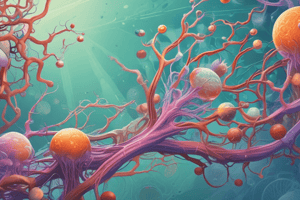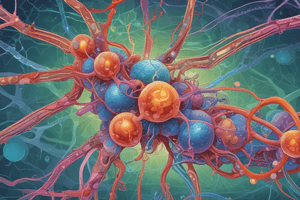Podcast
Questions and Answers
Which of the following is NOT a typical feature of cells?
Which of the following is NOT a typical feature of cells?
- Cell membrane
- Ribosomes (correct)
- Nucleus
- Cytoplasm
What is the main focus of cell biology?
What is the main focus of cell biology?
- The study of organisms
- The study of animal behavior
- The study of ecosystems
- The study of cells that make up all living organisms (correct)
Where does the electron transport chain take place in plants' chloroplasts?
Where does the electron transport chain take place in plants' chloroplasts?
- Protonoplast (correct)
- Thylakoid
- Mitochondria
- Cell membrane
What does the nucleus of a cell contain?
What does the nucleus of a cell contain?
What is the function of the Golgi apparatus?
What is the function of the Golgi apparatus?
Which process results in four daughter cells with half the number of chromosomes?
Which process results in four daughter cells with half the number of chromosomes?
What do hormones do in cell communication?
What do hormones do in cell communication?
Which organelle is known as the 'powerhouse of the cell'?
Which organelle is known as the 'powerhouse of the cell'?
What is the function of cell adhesion molecules?
What is the function of cell adhesion molecules?
What is the main focus of cell biology?
What is the main focus of cell biology?
What is the process that eliminates damaged or infected cells?
What is the process that eliminates damaged or infected cells?
What is the role of the Protonoplast in a cell?
What is the role of the Protonoplast in a cell?
Which organelle is responsible for producing energy through cellular respiration?
Which organelle is responsible for producing energy through cellular respiration?
What is the primary function of the Nucleus in a cell?
What is the primary function of the Nucleus in a cell?
What is the main function of the chloroplasts in plant cells?
What is the main function of the chloroplasts in plant cells?
What is the primary role of the Golgi apparatus in a cell?
What is the primary role of the Golgi apparatus in a cell?
Which organelle acts as the cell's 'garbage disposal'?
Which organelle acts as the cell's 'garbage disposal'?
What is the function of ribosomes in a cell?
What is the function of ribosomes in a cell?
What is the crucial role of the cell membrane?
What is the crucial role of the cell membrane?
What is the process by which a single cell divides into two identical daughter cells?
What is the process by which a single cell divides into two identical daughter cells?
Flashcards are hidden until you start studying
Study Notes
Title: Exploring Cell Biology: A Comprehensive Journey into the Building Blocks of Life
Introduction
Cell biology, an integral branch of biology, is the study of cells that make up all living organisms. This fascinating field delves into the intricate workings of cells and their various interactions, allowing us to unravel the mysteries of life at its most fundamental level. In this article, we'll explore cell biology's subtopics that have captured the imagination of scientists for decades and shed light on the wonders of these microscopic marvels.
The Cell: The Universal Building Block of Life
The cell is the fundamental unit of life, and each cell in an organism carries out a specific function, be it animal, plant, or microorganism. Cells come in various shapes and sizes but typically share certain features, such as a cell membrane, cytoplasm, and a nucleus. The cell membrane acts as a gatekeeper, controlling the passage of substances in and out of the cell. The nucleus, a membrane-bound structure, houses an organism's genetic code, or DNA, and is responsible for transmitting genetic information to the cell.
Cell Structure
The cell's structure is divided into an array of organelles, each with a unique function. They include:
- Protonoplast: a specialized thylakoid membrane where the electron transport chain takes place in plants' chloroplasts.
- Thylakoid: membranous sacs in chloroplasts that house pigments for photosynthesis in plants.
- Mitochondria: the "powerhouse of the cell," responsible for cellular respiration and energy production.
- Ribosomes: cellular structures that synthesize proteins using the information from messenger RNA (mRNA).
- Golgi apparatus: a sorting and processing center for proteins and lipids produced by the cell.
- Endoplasmic reticulum: a membranous network that aids in folding proteins, lipid synthesis, and calcium storage.
- Lysosomes: membrane-bound organelles containing hydrolytic enzymes that break down material waste and debris.
Cell Division and Reproduction
Cell division, a process that generates new cells from existing ones, is vital for growth, development, and repair. Cell division occurs in two main ways: mitosis and meiosis. Mitosis results in two daughter cells with the same genetic material as the parent cell, while meiosis generates four daughter cells with half the number of chromosomes, preparing them for sexual reproduction.
Cell Communication
Cells communicate with each other and their environment using various signaling molecules. They include:
- Hormones: chemical messengers produced in one part of the body that regulate activities in other parts of the body.
- Growth factors: proteins that stimulate cell growth and division.
- Neurotransmitters: chemical messengers that transmit information across synapses in the nervous system.
Cell Adhesion
Cells adhere to one another and their surrounding environment through specialized structures known as cell adhesion molecules. These interactions are essential for the formation of tissues and organs.
Cell Death
Cell death, or apoptosis, is a carefully regulated process that plays a crucial role in shaping the development of an organism, eliminating damaged or infected cells, and maintaining tissue health.
Conclusion
Cell biology is an intriguing and ever-evolving field that has provided countless breakthroughs in the understanding of life. From cellular structure to communication and reproduction, the study of cells has opened up new frontiers in biology, medicine, and technology. Our growing knowledge of cell biology will continue to fuel groundbreaking discoveries and applications in the future.
Studying That Suits You
Use AI to generate personalized quizzes and flashcards to suit your learning preferences.



